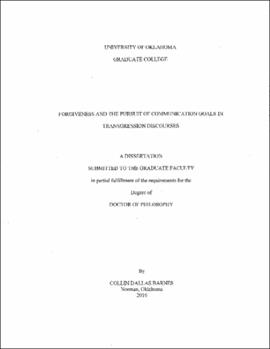| dc.description.abstract | In social psychology, forgiveness has been treated almost exclusively as a phenomenon that involves only two parties - namely, victims and their offenders. The present research takes a broader perspective by assuming that forgiveness is a process that can, and often does, involve third-parties, and that third-parties routinely become involved in the aftermath of offenses through transgression discourses. Within such discourses, different communication goals may be pursued by victims and those in whom they confide. In Study 1, offense victims were given the task of telling the story of a personal mistreatment to a third-party with the goal of soliciting either sympathy or objectivity from them. In Study 2, these same goals were given to third-parties who responded to the offense of another participant. A journal condition was utilized in both studies as a baseline for comparing the effects of the aforementioned manipulations on offense story/response content, forgiveness, and offense recollections. Results of both studies were partially supportive of the hypotheses. Victims who pursued the goal of soliciting objectivity gave generally less negative offense accounts, exhibited higher levels of forgiveness, and blamed perpetrators less one week after the first study session. Third-parties who pursued the goal of responding sympathetically generally affirmed the victim's negative perceptions of and reactions to an offense, expressed lower levels of forgiveness, and blamed perpetrators somewhat more when recounting the offense from memory. This research suggests that third-parties and communication goals can be important contributors to the forgiveness process and highlights the importance of a routine social activity for a phenomenon that has largely been viewed as dyadic in nature. | |
